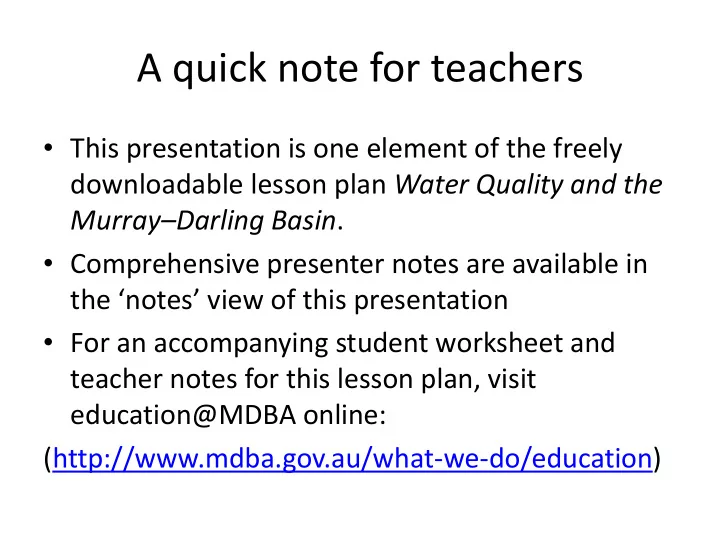

A quick note for teachers • This presentation is one element of the freely downloadable lesson plan Water Quality and the Murray–Darling Basin . • Comprehensive presenter notes are available in the ‘notes’ view of this presentation • For an accompanying student worksheet and teacher notes for this lesson plan, visit education@MDBA online: (http://www.mdba.gov.au/what-we-do/education)
education@MDBA Water Quality and the Murray–Darling Basin
Lesson overview In this lesson we will learn about: • Why water quality is important • Indicators of water quality • Monitoring water quality
Lesson keys • Listen to your teacher • Discuss • Play Run the River • Answer • Research • Investigate
Discuss What are some things that you use water for in the home?
What can we measure and how? What are 6 things that can make a river unhealthy?
Blackwater
Nutrients
Battery acid Lemon juice Vinegar Coffee Milk Fresh water Sea water Baking soda Detergent Ammonia Bleach
Answer 1. Identify six different attributes of water quality that we can measure 2. How can we test the pH of water? 3. Why is the dissolved oxygen content of water important?
Investigate Design an investigation to compare the quality of water at two different locations 100m apart from each other along a river near school.
Research 1. What are freshwater macroinvertebrates? 2. Name three different freshwater macroinvertebrate species. 3. What are three things that humans can do to improve water quality? 4. In pairs, make a 2½ minute documentary about the history of water quality in the Murray–Darling Basin. Include the following: – What water quality issues or challenges has the Murray–Darling Basin faced? – How have these challenges been solved?
Recap In this lesson we learnt about: • Why water quality is important • Indicators of water quality • Monitoring water quality
Recommend
More recommend